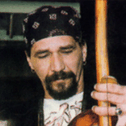Capoeira Music by Mestre Toni Vargas
- Antigamente (EN)
- A Saudade (EN)
- Campo de mandinga
- Capoeira escreve
- Capoeira me leva Capoeira me trás
- Cidadão considerado
- Corta cana no canavial
- Desapareceu no ar
- É pra vadiar
- Dono de verdade
- Dor, dor dor
- E pra Vadiar
- Era uma noite sem lua (EN)
- Foi na Lapa
- Meu Mestre é pequenininho (EN)
- Misturou
- Moleque do Morro (Capoeira meu povo)
- Na beira do mar, na beira do mar
- Navio Negreiro
- Nego Vai nego vem
- O menino é bom
- Quando eu venho de Luanda (EN)
Mestre Toni Vargas
 “I lived in Engenho de Dentro, suburb of Rio. There, I had a group of very special friends: we were more than friends, we were brothers of capoeira and of the spree in the rodas of life. There, I lived my more spontaneous meetings with capoeira, the youngster side, the vagrancy, the training in the land, without mestre, without nothing. The pleasure to sing and play berimbau at will (at that time to play in a roda you had to be bamba). the pleasure to discover in capoeira as an exit for our poverty, for the conflicts of the adolescence, to inaugurate a style of living. My friends were black and I also. I was “Black Power”. My dance was black, my girlfriends were black and what I more loved – the capoeira – she was black.
“I lived in Engenho de Dentro, suburb of Rio. There, I had a group of very special friends: we were more than friends, we were brothers of capoeira and of the spree in the rodas of life. There, I lived my more spontaneous meetings with capoeira, the youngster side, the vagrancy, the training in the land, without mestre, without nothing. The pleasure to sing and play berimbau at will (at that time to play in a roda you had to be bamba). the pleasure to discover in capoeira as an exit for our poverty, for the conflicts of the adolescence, to inaugurate a style of living. My friends were black and I also. I was “Black Power”. My dance was black, my girlfriends were black and what I more loved – the capoeira – she was black.
I entered in capoeira in the age of 10, with Mestre Rony, of the Group Palmares de Capoeira, in a quarter of the north zone of Rio De Janeiro. It was the chanse of my life. Unfortunately, he has already left. And his end was of misery, madness and pain as , by the way, one of the many that had helped capoeira and they couldn’t have a worthy end. I believe that it is responsibility of all the capoeiristas to fight so that, nowadays, this does not happen any more.
In the middle of the 70’s, I started to practise capoeira in the quarter of Penha, suburb of Rio De Janeiro, with Mestre Touro – Grupo Corda Bamba. He was my second Mestre. In Grupo Corda Bamba, I had the chance to know great mestres. And, certainly, to drink the axé of Mestre Touro, was fundamental in my history of capoeira.
With Mestre Leopoldina I did not have the honor to train, but I consider myself his pupil a bit. The mestre is of them that, stopping by his side, is already teaching you. I, whenever I can, am there “learning by beeing by his side”. By the way, in the old times it was like this, there was not a systematic education of capoeira, there were no methods nor didactics. It was to follow the mestre, to be attentive, and to look to transform that into something yours. Mestre Leopoldina when he sings, makes music or plays, he teaches. When he ufolds his incredible histories, he teaches. When he smiles or accept us in his house, he teaches. At last, the mestre does not need to give lessons to teach: he is the proper teaching.”
Information was taken from Mestre toni vargas website
Sobreviver Brincando – Retalhos de Mestre Toni Vargas from ABeiramar Capoeira Online on Vimeo.
